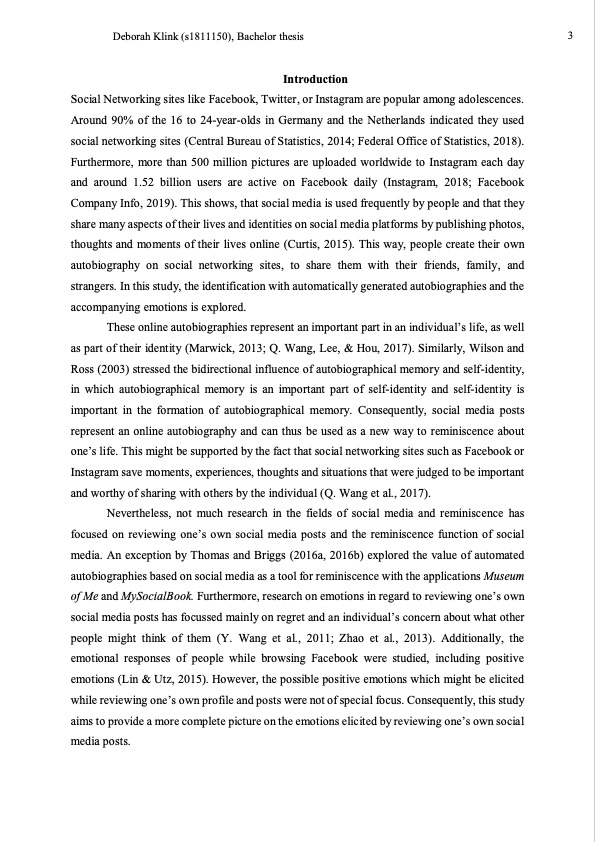
PDF Publication Title:
Text from PDF Page: 004
Deborah Klink (s1811150), Bachelor thesis 3 Introduction Social Networking sites like Facebook, Twitter, or Instagram are popular among adolescences. Around 90% of the 16 to 24-year-olds in Germany and the Netherlands indicated they used social networking sites (Central Bureau of Statistics, 2014; Federal Office of Statistics, 2018). Furthermore, more than 500 million pictures are uploaded worldwide to Instagram each day and around 1.52 billion users are active on Facebook daily (Instagram, 2018; Facebook Company Info, 2019). This shows, that social media is used frequently by people and that they share many aspects of their lives and identities on social media platforms by publishing photos, thoughts and moments of their lives online (Curtis, 2015). This way, people create their own autobiography on social networking sites, to share them with their friends, family, and strangers. In this study, the identification with automatically generated autobiographies and the accompanying emotions is explored. These online autobiographies represent an important part in an individual’s life, as well as part of their identity (Marwick, 2013; Q. Wang, Lee, & Hou, 2017). Similarly, Wilson and Ross (2003) stressed the bidirectional influence of autobiographical memory and self-identity, in which autobiographical memory is an important part of self-identity and self-identity is important in the formation of autobiographical memory. Consequently, social media posts represent an online autobiography and can thus be used as a new way to reminiscence about one’s life. This might be supported by the fact that social networking sites such as Facebook or Instagram save moments, experiences, thoughts and situations that were judged to be important and worthy of sharing with others by the individual (Q. Wang et al., 2017). Nevertheless, not much research in the fields of social media and reminiscence has focused on reviewing one’s own social media posts and the reminiscence function of social media. An exception by Thomas and Briggs (2016a, 2016b) explored the value of automated autobiographies based on social media as a tool for reminiscence with the applications Museum of Me and MySocialBook. Furthermore, research on emotions in regard to reviewing one’s own social media posts has focussed mainly on regret and an individual’s concern about what other people might think of them (Y. Wang et al., 2011; Zhao et al., 2013). Additionally, the emotional responses of people while browsing Facebook were studied, including positive emotions (Lin & Utz, 2015). However, the possible positive emotions which might be elicited while reviewing one’s own profile and posts were not of special focus. Consequently, this study aims to provide a more complete picture on the emotions elicited by reviewing one’s own social media posts.PDF Image | Facebook and Instagram emotions identification automatically generated autobiography

PDF Search Title:
Facebook and Instagram emotions identification automatically generated autobiographyOriginal File Name Searched:
thesis-instagram-comparison-instagram-vs-facebook.pdfDIY PDF Search: Google It | Yahoo | Bing
Cruise Ship Reviews | Luxury Resort | Jet | Yacht | and Travel Tech More Info
Cruising Review Topics and Articles More Info
Software based on Filemaker for the travel industry More Info
The Burgenstock Resort: Reviews on CruisingReview website... More Info
Resort Reviews: World Class resorts... More Info
The Riffelalp Resort: Reviews on CruisingReview website... More Info
| CONTACT TEL: 608-238-6001 Email: greg@cruisingreview.com | RSS | AMP |